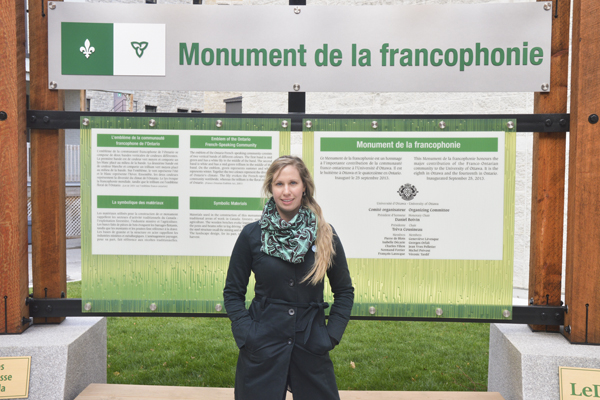Photo by Marc Jan
It’s time for Ontario to offer more and better options to its prospective students who want to study in French.
The Regroupement étudiant franco-ontarien (RÉFO) launched a public consultation in early October to discuss the state of French post-secondary education in Ontario and establish a community action plan for the next 10 years. The organization aims to present its plan to the Franco-Ontarian community and the Government of Ontario before June 30, 2014.
Considering Franco-Ontarians are plenty in number but hugely underrepresented at universities throughout the province, it’s an important discussion to have.
Isabelle Gagnon, one of three RÉFO co-presidents, said the public consultation is “really about finding out the current state of affairs with the community” (translated from French) in regards to French post-secondary education in Ontario.
Gagnon, a business administration student at the University of Ottawa, said the organization’s best-case scenario is the creation of a full-scale Franco-Ontarian university. The only existing institution of this kind is the Université de Hearst, with only 30 academic staffers and 800 students at campuses in Hearst, Timmins, and Kapuskasing, Ont.
“It’s obvious that we’re in favour of a Franco-Ontarian university, we aren’t trying to hide that fact, but we’re also surveying all the regions of Ontario to see what’s already available, what’s well done, and what can be improved insofar as the post-secondary services in French Ontario,” she told the Fulcrum.
The RÉFO’s public consultation will conclude with a conference at La Cité collégiale on Nov. 30 and the organization plans to meet with university president Allan Rock to discuss French education in the province.
While the creation of any university is a considerable task, there’s no time like the present to begin the conversation.
“It’s not just a question of being ready, it’s really a question of having the right to it,” said RÉFO co-president Geneviève Latour (translated from French). “As far as what it would bring to our community, education is really a pillar of perpetuity in any community and having the governance of our institution is paramount.”
Latour, herself a U of O student studying social sciences, said what would benefit Franco-Ontarian students most is an institution governed by—you guessed it—Franco-Ontarians.
“We have it at an elementary and secondary level, as well as with colleges, and we’ve seen a real success with it,” said Latour. “It’s now time to ask ourselves if we want the same type of governance at a university level.”
Specifically, the RÉFO has focused much of its attention on southwestern Ontario, where there is a significant lack of available post-secondary education in French. The region is home to more than 100,000 bilingual Canadians and roughly 118,000 French speakers. Presently, Franco-Ontarians have access to only 3 per cent of post-secondary programs in the region, compared to 36 per cent in the east and 33 per cent in the north.
Earlier this fall, Monte McNaughton, member of provincial parliament for the Lambton-Kent-Middlesex riding in southwestern Ontario wrote an open letter to U of O president Allan Rock asking him to expand the university into his riding, in response to a university strategy document sent to the Ministry of Training, Colleges and Universities about a year earlier.
“We are examining the possibility of creating a satellite campus in South-Western Ontario, where the growth in the Francophone community is strongest and French-language postsecondary education is unavailable,” the document states.
But what Ontario doesn’t necessarily need is another bilingual campus. Even at the University of Ottawa, which is touted as “Canada’s university” and holds its bilingualism in high regard, the student population is nearly 70 per cent English, according to university data from 2012.
Last month, the Fulcrum reported that the U of O has cut tuition fees for international students studying in French. University president Allan Rock said the idea is that this will attract more students from overseas to study in French at the U of O—rather than a Quebec school—and more paying students would offset the loss of revenue from reduced tuition fees.
The U of O is reaching out to French speakers—but not ones in Ontario.
What French-speaking students in Ontario need is the option to study at an institution that’s tailored just for them. That’s not to say our French-speaking friends should necessarily be at a Francophone school instead of a bilingual university like the U of O. But it’s only fair they be given the option.
“I think it’s a question of choice, and having a right to making the choice of continuing one’s studies in one’s own language,” said Latour. “If you can go from kindergarten to Grade 12 and then college in French, why not university?”
That choice is invaluable considering how few choices there currently are. François Boileau, Ontario’s French language services commissioner, noted in a report published in June 2012 that only five of the 21 post-secondary institutions in the region offer some French-language programs.
“With the rapid growth of Central-Southwestern Ontario’s Francophone population, it is more critical than ever to remedy the insufficient number of colleges and universities in that region that offer French-language programs and services,” said Boileau.
In an interview with Le Droit, Brad Duguid, Minister of Training, Colleges and Universities, said the provincial government has made “a lot of progress since coming to power in 2003, but we recognize that there are still large differences in the accessibility of post-secondary education in French.”
Numerous university directors and provincial government decision-makers are repeating the same sentiment: There’s simply not enough post-secondary education available to French speakers in Ontario. The RÉFO is on the right track in encouraging the Franco-Ontarian community to demand action—because education is expensive, and talk is cheap.





